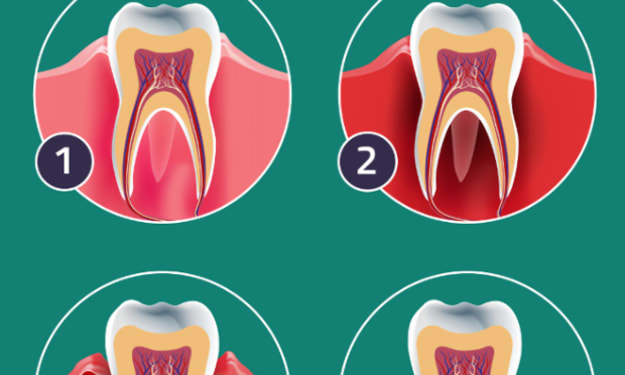
Gum pain is never enjoyable. They may be barely sensitive or large, bloody, and red.Sore gums can result from a number of different things,but if the reason is identified, the pain is usually always manageable.
What Causes Gum Pain?
Gum discomfort can be brought on by a variety of problems.
Knowing the underlying cause is crucial so that the problem can be properly treated.
Canker Sores
Canker sores affect more than half of the population.
1 These are uncomfortable sores that develop on the gumsand other soft tissues of the mouth. They typically recoveron their own in a week or so. They may be the result of an immunological response in which white blood cells attackcells in the mouth, however their exact aetiology is unknown.
1 Canker sores can occasionally be brought on by specific mealsor substances in toothpaste, and they can also be brought onby diseases like Crohn's disease or nutritional deficiencies.
Gum Disease
Gum disease may be indicated by your sore gums.
2 The infection is typically brought on by bad brushing and flossing habits,but there are other possible causes as well, including as diabetes, some drugs that limit saliva, and heredity.
2 You could require a thorough cleaning of your mouth and gums froma periodontist who specialises in treating gums and gum disease. Surgery can be needed for severe gum disease.
Rough Brushing and Flossing
Too much pressure when brushing or flossing your teeth can irritate your gums,which over time can cause discomfort and sensitivity. Take your time when flossing, being gentle but thorough, and use a toothbrush with soft bristles.You can learn the right procedure from your dentist.
Tobacco
Gum disease is twice as common among smokers and users of smokeless tobacco,such as dip, as it is in nonsmokers.
3 Your immune system is compromised by tobacco use, making it more difficult for you to fend against illnesses and infections, including gum infections.Additionally, gum disease treatments might not be as effective and it might take longer for your gums to heal. 3
Food Allergy
Gum pain occasionally results from dietary sensitivities.For instance, individuals with pollen fruit syndrome (PFS),also known as oral allergy syndrome (OAS), may experience swollen and itchy gums,lips, tongues, and throats after consuming specific fruits and vegetables,such as apples.
4 Swollen gums may eventually become painful and irritated.
OTC antihistamines are one type of treatment for PFS.
Hormonal Changes
Your gums may be impacted by the changing hormone levels in your body.Progesterone, a hormone that rises during puberty, can increase blood flow to the gums, making them more sensitive and sore.
5 Pregnancy-related hormonal changes and an overall increase in blood
flow can raise a person's risk of developing painful gum disease. 5
Abscessed Tooth
An abscessed tooth is a fractured or unhealthy tooth that gets a bacterial infection in the root.
6 Gum discomfort, edoema, fever, and other symptoms are possible outcomes.
Antibiotics, localised drainage and cleaning, and/or a root canal may all be used as treatments.
How to Treat Gum Pain at Home
Gum discomfort can occasionally be managed at home, even momentarily while awaiting dental care.Always make sure it's safe for you by checking with your dentist beforehand.
Gargling Saltwater
Dental pain can be easily and effectively relieved with a saltwater rinse.
7 It may even lessen your risk of developing gum disease by
assisting in the control of bacteria and plaque. 8
Over-the-Counter Pain Medicine
Gum discomfort may be treated with over-the-counter painkillers. Because they block an enzyme that produces red and swollen gums, nonsteroidal anti-inflammatory medications (NSAIDs) including Advil, Motrin (ibuprofen), and Aleve (naproxen) are a suitable option. 9
Cold Compresses
A cool compress works better than a hot one to soothe gum discomfort.
10 Never put a compress on your gums; instead, use it on your face.
Prevention
The greatest strategy to stop gum discomfort is to maintain good oral health. twice day, vigorous brushing with fluoride-containing toothpaste
Flossing each day
.Having a cleaning at the dentist every six months
.Limiting alcohol consumption and avoiding cigarette use
When to See a Dentist
A dentist can provide you with a full evaluation to look for any underlying causes if you experience gum pain, bleeding or swollen gums, or discomfort when eating. Inform your dentist of any prescription drugs you are taking as well as any ongoing medical issues you may have, such as diabetes, as they might have an impact on your dental health.
Summary
Numerous conditions can cause gum discomfort.
Knowing the root of the problem is crucial for effective treatment.
While you wait for treatment, you may find relief using over-the-counter.
medications and salt water rinses, but consult your dentist first.
A Word From Verywell
Even while gum pain may not initially be severe, if it is ignored,
it can seriously harm your mouth and teeth.
If you experience any discomfort, call your dentist .
About the Creator
Enjoyed the story? Support the Creator.
Subscribe for free to receive all their stories in your feed. You could also pledge your support or give them a one-off tip, letting them know you appreciate their work.





Comments
There are no comments for this story
Be the first to respond and start the conversation.